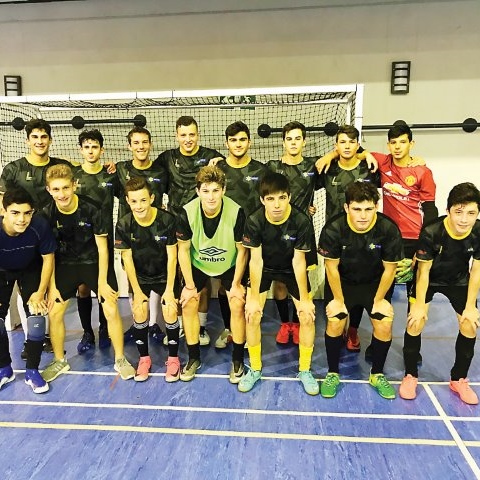click to dowload our latest edition
CLICK HERE TO SUBSCRIBE TO OUR NEWSLETTER


Published
5 years agoon
By
adminLUKE ALFRED
In the dead weeks before departure, time stands still. Late injuries are a constant danger, and keeping excitement within manageable proportions is a job in itself, he says.
“It’s one of the worst periods as we approach Budapest,” Cohen says wryly. “We’re excited, but we don’t want to arrive in Hungary carrying too many niggles. Generally what we do over the next few weeks is play more matches, but reduce the intensity of training and concentrate on warm-ups and warm-downs to keep injuries to a minimum.
“I also encourage them to sit on the couch and watch football on YouTube,” he says. “It’s safer!”
Futsal players make up about half of South Africa’s 90-strong delegation to the 15th European Maccabi Games in Budapest held between 30 July and 6 August. Divided into four categories – under-16, under-18, Open and Masters – Cohen says this is the first time ever that futsal has entered teams in all four age groups to a Maccabi event.
He isn’t shooting his mouth off, but he’s quietly hopeful that all the hard work and fundraising of the past 18 months pays off, and medals can be brought back in all four groups.
The Open and Masters teams won bronze in Berlin in the 2015 European Maccabi event, and remain fundamentally the same sides, with the current under-18s also taking bronze at the 2017 Maccabiah as under-16s. “They’re a talented bunch, and have developed since then,” says Cohen of the current under-18s. “I’m hoping they can push on, and now take gold.
“I also have high hopes for the under-16s. We’re holding thumbs they can come back with a medal.”
For those who don’t know, futsal is a five-a-side game played on an indoor court. It originated in South America in the 1930s, where limited space in urban centres meant that football needed to be customised into a smaller, more easily accessible game. The game is quick, precise, and technically demanding, with futsal players generally finding that they have more space and time when they graduate back to the larger 11-a-side pitch.
The name “futsal” derives from futbol sala meaning indoor soccer in Spanish.
In South Africa, the game caught on in the post-2010 World Cup period with the building of soccer courts in Johannesburg and Cape Town. Sometimes these were privately or council-owned, and sometimes they took root at schools such as Herzlia and King David Victory Park. It has also been said that the courts were useful in the Cape’s recent water crisis because they didn’t need to be watered.
Cohen says that while he has high hopes for all four teams participating in Hungary, not all will be playing on a level playing field. This is because different categories of futsal attract a different number of participants.
For example, the younger age categories tend to have smaller fields, while the Masters and Open have nine and 10 participants respectively, obviously making the taking of a medal all the more difficult.
As a general rule, Cohen says that Great Britain and the European nations tend to dominate in the younger age categories, while the Open and Master’s divisions attract a broader range of participants, including, say, the Turks. “There’s a lot of banter beforehand. The banter on, say, WhatsApp is what it’s really all about,” he says. “I’ve been in conversation with a Turkish friend recently – they beat us in the Master’s category in the semi-finals in Berlin in 2015 – and we’ve been joking that this time round, we’re going to meet them in the final.”
This will be Cohen’s eighth Macciabiah overall. Remarkably, he started out winning table tennis bronze as a 15-year-old in his first games in 1997, and has progressed through the ranks to playing in, coaching, and managing futsal teams since the South Africans first started taking futsal to the event.
It’s been a heady ride, but not one without hiccups. As a member of an Open South African futsal side at the Pan-American Maccabi Games in Sao Paulo in 2011, the team of which he was part were hammered 21-1 by their Argentine counterparts. Cohen can laugh about it now, but being humiliated at the time wasn’t pleasant.
Twenty-goal drubbings aside, Cohen is counting the days until the South African delegation take their place in the march-past, the ceremony serving as the games’ traditional opener. “They’ll be wearing their golf shirts and their shorts. That’s my advice. I’ve told them it can get pretty hot there, there’s no use in wearing a tracksuit,” says the man who will be managing, playing in, and coaching the Open futsal side in Budapest.
When he takes off those many hats (what does he do when it’s time to be substituted?) he’ll kick back and enjoy himself, meeting old mates, and renewing acquaintances. “The sport is a tool to make ever-lasting relationships,” he says. “And, who knows, we might just have a beer or two as well.”
